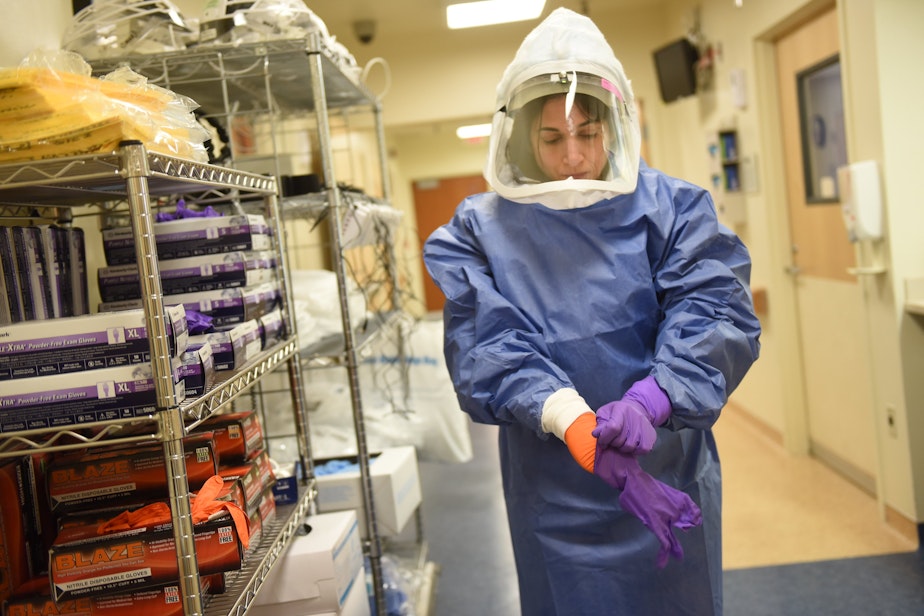‘It’s almost a last-minute situation.’ Healthcare facilities frustrated by lack of supplies

Healthcare facilities in Washington state continue to worry if they’ll have enough masks and other equipment to protect their employees.
KUOW’s Anna Boiko-Weyrauch joined Morning Edition host Angela King to talk about these concerns and what’s being done to get more equipment.
RELATED: Several Seattle-area hospital workers infected with COVID-19
King: How low are supplies running for protective equipment?
Boiko-Weyrauch: It varies from place-to-place. I’ve been reaching out to people in healthcare, hospitals and long-term care organizations. The biggest needs I’m hearing come from the long-term care and assisted living facilities. Those are communities caring for older adults, and the outbreak has really hit those kinds of facilities hard.
I talked to Robin Dale, he leads the Washington Health Care Association, which represent long-term care and assisted living facilities. He told me his group is getting constant requests for supplies for personal protective equipment, also known as PPE. In particular masks – especially N95 masks – protective gowns and face shields. This equipment is to protect workers in long-term care and assisted living facilities.
Dale said that “They have a COVID-19 patient in their facility and they’re asking for PPE so that they can protect their workers and other residents and it’s frustrating that there’s such a short supply."
Boiko-Weyrauch: On top of that, getting more supplies is not straightforward.
King: How are requests for supplies being handled?
Boiko-Weyrauch: Well, they go through quite a few hands. I asked that question to Public Health – Seattle & King County. They said that when a healthcare provider submits a request it passes through four or five different organizations before get to the feds. That includes different state and local health and emergency operations organizations.
Then the federal government takes a few days to approve the order and load up supplies on to a plane. Then the supplies go back to the Washington State Department of Health to inventory, store, and fulfill orders. The State Department of Health puts the equipment on trucks to specific locations. That can take several more days, according to Public Health – Seattle & King County.
Nursing homes and assisted living facilities don’t have big stockpiles of this gear like hospitals do to cushion them in between shipments. But Dale said so far the most urgent requests have been met.
According to Dale: “Once we get through, or get people to understand the need, it has come relatively quickly, but sometimes it’s almost a last minute situation where they’re a day away of running out of PPE.”
Boiko-Weyrauch: In other places, hospitals are rationing the supply of masks and are not getting the amount of supplies they requested. They’re also now allowing healthcare workers to use plain surgical masks under some circumstances instead of the heavy-duty N95 masks.
They’re also re-using masks. For example, using one N95 mask per day, sticking it a Ziploc or Tupperware in between patients, and then throwing it away at the end of the day.
King: Anna, what’s being done to address these shortages?
Boiko-Weyrauch: In the past few weeks the state has received shipments of supplies from the national stockpile. So far two shipments with tens of thousands of gowns and gloves, and hundreds of thousands of masks. But the state says that’s not enough.
Governor Jay Inslee has been asking the vice president to allocate more of the stockpile to Washington State because our need is so great. Members of congress from both sides of the aisle representing Washington are also pushing for more supplies.
This week they sent a letter urging the secretary of health and human services to fully respond to the state’s requests for equipment.
Also, a few departments at the state level are also looking for other sources of the equipment. We may get more information on that later on today.





